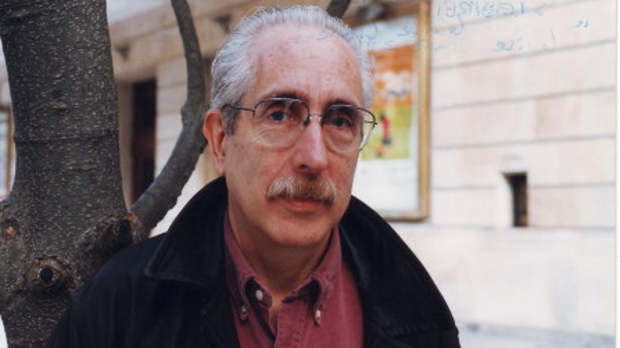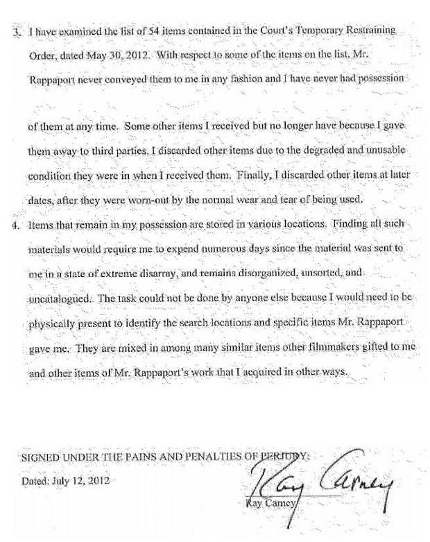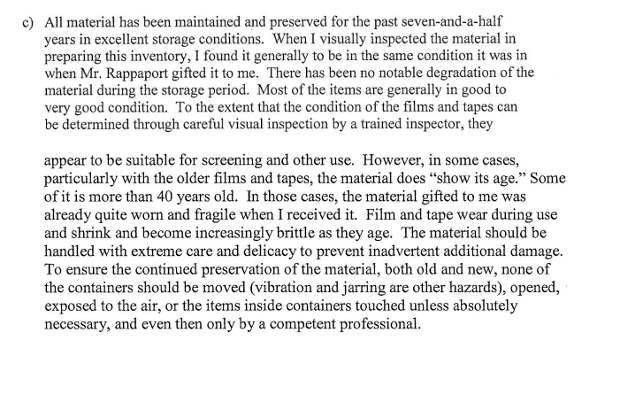 Back to selection
Back to selection
Mark Rappaport Fires Back at Ray Carney
 Mark Rappaport
Mark Rappaport So, it took Ray Carney 11 months to respond to Mark Rappaport’s allegations (we published parts of Carney’s open letter earlier this week), but no time at all for Rappaport to fire back at the Boston University professor.
Here’s what Rappaport had to say:
Everyone seems to be so concerned about Carney’s side of the story. All well and good. It took him over 11 months to come up with a letter filled more with hot air than with information—mostly about how everyone is treating him badly, and especially me, who has unfairly, it seems, spreading lies about him on the internet. I don’t intend to go over his attacks and vilification of me point by point and give concrete evidence (which I have in the numerous e-mails he sent me) of his prevarications. Just showing you a couple of examples of his egregious lies might give you an idea of what Carney, who talks endlessly about ethics and morals and honesty and truth (from now on we capitalize them), veers from anything resembling truth when he talks about this situation.
When he finally showed up in court after the third try, after he had defaulted twice and was going to be held in contempt of court unless he turned over my materials (I was paying a lawyer for the other two no-show court appearances of which he had ample notification at his primary residence via FedEx, signed by Mrs. Carney)
This, dated July 12, 2012, three months after I initially tried to contact him by phone (2 phones) and e-mail (3 e-mail addresses) to no avail, was presented to the court. This is his response to the detailed inventory I presented. Carney’s response is shown here with absolutely no alterations, scanned in from the court record.
This from the man who, in another lifetime, wrote about me as “a genuine national treasure,” “one of the world’s great artists,” and “the greatest living American filmmaker.” Maybe I should have been tipped off by the over-blown hyperbole, but who doesn’t like being praised? Strangely enough, the judge never demanded to know where all these materials were stashed and to this day I am in the dark, although I have my suspicions—the same place Norman Bates keeps his mother. But the judge did demand a complete list of everything that Carney did have. Another hearing in front of the judge, which I had to pay my lawyer for—$20,000 by now. After I recovered from this grim bit of news, I decided to call up various labs to get prices on digital transfers from 16mm negatives. The price was a lot cheaper than the cost of going to full trial, which would have cost north of an additional $25,000. Just to get my own stuff back.
Fourth meeting with the judge, but only the second with the defendant’s counsel present. Dated August 27, 2012, scanned in from the original court document. This was Carney’s response to the request of the court to supply a full inventory of what he had. He then proceeds to give a full inventory of absolutely everything I had asked for. Nothing whatever was missing
And the document was signed
In other words, he signed two documents, under oath, with totally contradictory testimony. I think there’s a word for that that begins with a “p.” Well, look, I was delighted that my stuff was intact and safe. Sort of. As for the “p” word itself, it doesn’t require a judge to rule on it. Just doing it fits the definition. This from the man who talks about Ethics and Morals and Honor and Truth and…Whatever. The first words his lawyer said to my lawyer were that Carney “will never return the materials. Ever!” So far, that part of it has been true.
He did try to get in touch with me a week before the final court session to make a deal. I sent him e-mails every day asking what he had in mind but he didn’t respond to them. The phone number he gave me was shut off. I told him that if he delivered all the stuff to my lawyer’s office we could call the suit off, although I had already planned to call the it off, due to the additional expense. The day before the hearing, after business hours Boston time, he writes me a breathless e-mail telling me how email service doesn’t really work very well in Vermont. But, anyway, he was in Boston. E-mail doesn’t work there either. In other words, no deal. Jon Jost has the full correspondence on this particular point and may publish it at some later date. But I mention it for a reason. I asked him to deliver the materials to my lawyer in Boston, where Carney lives. After he couldn’t bring himself to make a deal, he then told my lawyer that he would settle if I gave him $27,000.
I would just like to point out two other, well, “discrepancies” between what Carney has said. In an article in Artinfo, I was very surprised to read this:
“According to a former colleague of Carney’s who wished to remain anonymous, and who spoke
to Carney immediately after news of the situation began spreading around the Internet, Carney,
at that time, claimed that he never refused to return Rappaport’s materials but only wanted him
to cover the shipping costs to send them to France. Carney also said, according to this source,
that the online reports circulating were filled with mistruths.”Oh, so that’s what the money he wanted was for, despite the fact that I never asked for anything to be sent to France. Ever. But according to this news item that’s what the $27,000 was for, even though both my lawyer and Carney were in Boston. Which brings us to the refreshingly improvised story about him spending thousands and thousands of dollars restoring and preserving my films. He had never once, in all the years that he had the materials, mentioned to me, or to his lawyer that he spent anything at all, stashed, as they were ”in various locations.” When he was required to provide an inventory, it couldn’t be clearer that he had not even opened the boxes that they were shipped in, seven and a half years ago. He didn’t even know what was in the boxes until he was forced to itemize the contents. The same was true in 2010, when I initially asked him for some of my video masters, which he did, fortunately for me, return to me. He went looking through the boxes to find them. And again, everything I asked for, he found.
And to conclude, here is a copy of an e-mail I sent to Carney, before I initiated a law suit, after many days of not getting a response from him. This was dated April 26, 2012, while he was still teaching. It was sent to all three of his e-mail addresses and a copy was even hand-delivered to his office at school.
“Ray—
I have repeatedly asked you to send me the materials I left with you seven years ago. I especially need the digital masters of THE SCENIC ROUTE, IMPOSTORS, CASUAL RELATIONS, and CHAIN LETTERS. I already told you that I have two companies that are very interested in streaming my films. Without these digital masters, I can’t do anything. The digital masters can also be used for DVDs and any future video technologies down the road. Without them, these films are effectively lost. When you generously, or so I thought, offered to take my “archives” seven years ago, I thought I was depositing them with Boston University, not with you personally. Nor did I ever imagine there would be so much difficulty and resistance to getting my stuff back.. Since streaming technology didn’t even exist seven years ago—and if it did, I didn’t know anything about it—I couldn’t have foreseen how crucial the materials I placed in your hands would be for future showings of my work.
In addition, you have 16mm copies of many of my films, both short and long, as well as different drafts of scripts and copies of reviews and other artifacts. I have, over the last few years developed relationships with George Eastman House and also, especially, with the Cinémathèque Française here in Paris, and I believe that they would be more than willing recipients for many of the items in the boxes I sent you. And much more reliable custodians for making my work available to whomever might be interested in it.
I haven’t the foggiest idea of what it could possibly mean to you to hold onto to these materials, yet your reluctance to return emails or phone calls or to make yourself even remotely accessible to my needs suggests your unwillingness to relinquish my materials.. To me it means a great, great deal to have access to them.
Maybe you haven’t considered this or thought about this at all, but I have. Your unwillingness to return my tapes (and everything else) to me would effectively guaranty my disappearance from the film world. For good. If I’m not able to provide the digital tapes of THE SCENIC ROUTE, CASUAL RELATIONS, IMPOSTORS, and CHAIN LETTERS, they are as good as lost, as if they had never been made, as if I had never made them, as if I didn’t exist. The chance to get them out in whatever digital format would guarantee that they would be shown, somehow, somewhere. Without the digital tapes, the negatives will continue sitting in the vaults of MOMA, untouched, unwatched, unavailable forever. The chances of anyone or any organization either having the interest, inclination, and, even more importantly, the cash to go through the very expensive process of digitizing these films, during my lifetime, is next to nil. I might as well never have made them. You are, in a sense, negating my life as an artist. If you, who used to proclaim yourself my most ardent supporter, want this added to your resumé—that he was also the guy who willfully, knowingly, and deliberately was responsible for keeping Rappaport’s films permanently out of circulation, for willingly suppressing them, for whatever reasons, making sure that they never saw the light of day again within my lifetime, so be it. At this point, it is you, not an uncomprehending, unappreciative world, who is preventing me from reaching audiences that might never have had a chance to see my films before. It is you who is willfully depriving me, not only of finding new audiences and resuscitating my reputation, but also depriving me of any incomes I might get from the showings of these films in any digital formats. Do not fool yourself with any intricate rationalizations—at this point, you are the main obstacle to my films being seen during my lifetime. If you want this little footnote attached to your name, so be it.
I would like all my stuff back as soon as possible.
You can send all the materials I sent you via FedEx (three day delivery) to _______, __________, New York, New York 10012, _________. Charge it to my Visa account #___________. Expiration date ______. # on the back _____.
I expect you and implore you to do this as soon as possible.
Mark”
For all the obvious reasons, I left out the name of the person to whom the stuff was to be sent as well as my credit card number. I think this blows the lid off the anonymous colleague story who said Ray just wanted to money to return my materials to France. Or that I expected him to pay the shipping costs. The man will say anything to anyone. Fortunately for me, internet exists. Thanks to the very generous and unstintingly gracious and time-consuming efforts of Jon Jost and Daniel Levine, I was able to get this story out into the world. They organized a petition on my behalf signed by 1,200 people within a week and a half imploring Carney to return my stuff to me. Among the signatories were Gus Van Sant, Todd Haynes, Atom Egoyan, Susan Seidelman, Guy Maddin, Jim Jarmusch, Tom DiCillo, Monte Hellman, Costa-Gavras, Barbara Kopple, Bela Tarr, John Waters, Olivier Assayas, as well as, from the other side of the aisle, Ken Jacobs, James Benning and many, many more. I think these people know what it is to make a film and can appreciate what it means to be deprived of your own work. None of this made any impression on Carney.
Here are links to Jon Jost’s website, laying the issues out as clearly and cogently as possible.
http://cinemaelectronica.wordpress.com/2012/09/10/chained-relations/
http://cinemaelectronica.wordpress.com/2012/09/20/chained-relations-2/
Not a single word in any of the petitions, letters, and documents I have sent out is a lie or an invention or a distortion. And this is the very short version of the whole mess. For those of you who want to hear Carney’s side of the story, as if there isn’t enough information out there already, I wish you luck. So far it has been filled with nothing by obfuscations, evasions, prevarications, procrastination, contradictions, bombast, and self-pity. He will bellyache endlessly about how I gave my life’s work to him as “a gift”— not so—and therefore will not relinquish it, even though he has no use for it, can’t do anything with it and, probably—I’m only guessing here—doesn’t even want it. Everybody seems to do him dirty. But most of all, Ray Carney.



